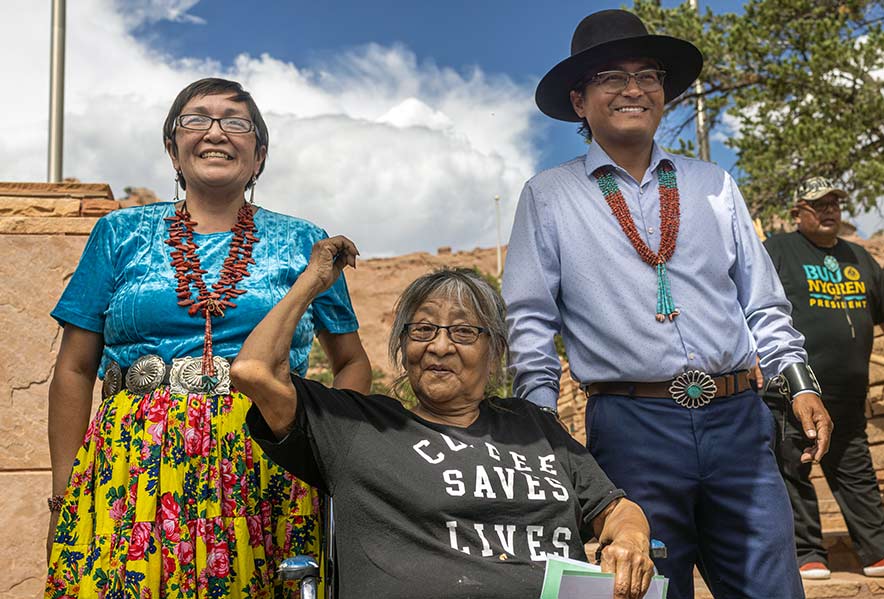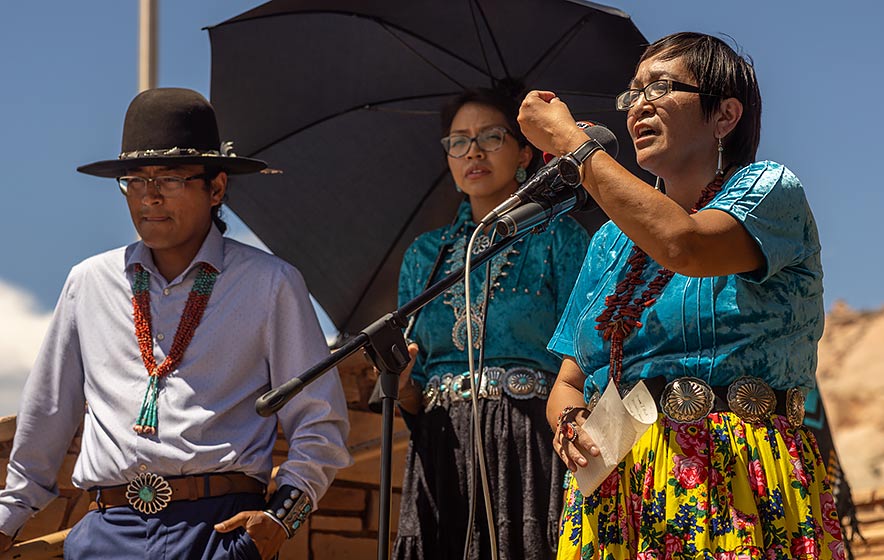
Aiming for balance: Nygren picks Richelle Montoya-Chee as running mate

Navajo Times | Sharon Chischilly
A supporter raises her hand as she takes a photo with candidate for Navajo Nation president Buu Nygren and running mate Richelle Montoya Chee at the Veterans Memorial Park in Window Rock on Monday afternoon.
SANTA FE
On Monday afternoon at Veterans Park, candidate Buu Nygren thanked voters for their support in the primary election and proudly announced his pick for running mate, Richelle Montoya-Chee.
Montoya-Chee is from Torreon/Star Lake Chapter where she is chapter president and member of the Na’ Neelzhiin Ji Olta’ Inc. board.
Nygren told supporters his decision to select a woman as his candidate for vice president came very naturally as he was raised by his mother and grandmother and has been guided by many female teachers and mentors in his life.
“There has always been strong women leadership and why not honor it at the highest level of the Navajo Nation for the very first time in our history?” he said. “If you voted for change in this past election, let’s continue to move that forward, because our campaign started with thinking for the future!”
With his wife, attorney Jasmine Blackwater-Nygren by his side, Nygren, from Red Mesa, said it’s about time women’s voices are heard across the Nation.
“We are here to challenge the status quo,” he said. “The Nygren-Montoya ticket will make sure everyone’s voices are heard every day in the president’s office.”
Nygren’s campaign values include honoring Navajo culture, language and k’é through inclusivity and progressive positive change.
Nygren told the Navajo Times that Richelle was selected from a pool of 16 applicants who submitted resumes.
“On the campaign trail, I always talk about how we need competence, compassion and team players,” he said.
He said he was looking for someone who is practical, intelligent, and diplomatic, who understands government and speaks Navajo and English.
“Richelle fit the bill,” Nygren said.
‘A woman leader’

Navajo Times | Sharon Chischilly
Candidate for Navajo Nation president Buu Nygren selected Richelle Montoya Chee from Torreon, N.M., as his running mate. Nygren made the announcement at the Veterans Memorial Park in Window Rock on Monday afternoon.
In her remarks, Montoya-Chee emphasized the importance of bringing balance to the Navajo Nation government in line with traditional values.
“I was raised in a traditional Navajo home,” Montoya-Chee said to the Navajo Times. “My mom and my grandmothers and grandfathers have taught me that everything in our culture, in our daily lives, has to have a female and male perspective.”
She believes that concept should also apply to the Office of the President and Vice President.
“It brings balance to the government,” she said. “We haven’t seen that yet.”
Nygren said he also appreciates Montoya-Chee’s ability to listen and the fact that she’s overcome adversities in her life.
“She’s a woman leader in her community,” he said. “Her experience at the grassroots level means a lot to our ticket.”
Montoya-Chee, who is married to Army veteran Olsen Montoya, said ever since she was 18 years old, her mother and father instilled in her that she needed to be a part of her community and its decision making.
“It takes everyone to make sure that the community is prosperous and that everything is balanced in a good and harmonious way,” she said.
As an example, Montoya-Chee said she always makes sure to include elders and youth and mothers and fathers in chapter meetings.
“I bring an openness, a listening ear, a fairness,” she said.
The Nygren campaign is thinking not only for the communities today, but for future generations, she said.
“Dr. Buu Nygren is also a good listener,” she said.
“That’s what I truly liked about him because that’s how my grandfathers were,” she said. “They told us to listen, to be respectful and to always do what we say we’re going to do.”
‘Accountability and transparency’
Nygren’s vision is to create a strong, self-sustaining Navajo Nation where all Diné can thrive by building up the economy, raising healthy families, teaching Navajo language and culture and reviving the spirit of Navajo independence.
He also wants to give more authority and autonomy to the 110 chapters by empowering communities to innovate at the local level.
Nygren told the Navajo Times that, if elected president, he intends to integrate what he’s learned on the campaign trail into his platform to respond to the people’s needs.
He will work toward eliminating inefficiencies, redundancies and silos in Navajo Nation government by revamping Navajo Nation laws, policies and regulations as needed.
“The Navajo people want somebody who is committed to serve and to working together to get things done,” he said. “Someone who will make sure the government is effective and held accountable at the Window Rock level and the local level.”
He said one of the things he’s learned is that the people want a leader who is willing to listen and, by the same token, will keep everyone updated on progress within the government.
“There has to be accountability and transparency,” he said.
Nygren said he has heard a lot of complaints from people regarding delivery of services from Navajo government divisions.
“When they submit things, they want to know where they are in the process and if they’re going to get help,” he said. “They want to make sure the government is going to do what they say.”
So improving communication between executive branch leaders and the public will be top among Nygren’s priorities.
Included in that will be training for division directors about information sharing and timely response to constituents.
“Every division has a sole purpose of delivering specific services,” he said. “Sometimes people need a response right away.”
He said another thing he’s heard everywhere across the Nation that people want better roads.
“People tell me, ‘Buu, we spent so much money on our vehicles, but the roads are dangerous,’” he said.
“They say, ‘Why don’t we have gravel pits, why don’t we have a road maintenance program? What is happening here – we should be the experts of roads,’” he said.
In turn, Nygren said he is going to request Interior Secretary Debra Haaland to sign off on gravel pits for the Nation.
“Let’s make our own investments, because right now we import just about everything,” he said. “We’ve got all this land and we should be able to do it.”
Nygren said people also complained about the new heavy equipment at chapter houses sitting idle.
“’Is it all just for show?’ is what a lot of them ask,” said Nygren. “‘We spent all this money on acquiring them and no one’s using them,’ they say.”
As a solution, Nygren wants to consolidate and hire equipment operators to serve chapters in close proximity to each other.
“One chapter can’t keep a qualified operator on site working, but if we connect a few chapters together and hire one qualified equipment operator who is always working on the grader, always hauling water, working on the roads, that could go a long way,” he said.
Investing in people
On the campaign trail, Nygren said he also heard a lot of complaints about the pay scale on Navajo and how, especially with the price of gas, a lot of employees barely have enough to get by and provide for their families.
For that reason, one of Nygren’s top priorities will be passing a minimum wage law that would raise the hourly wage on Navajo to be comparable to surrounding states.
He also wants to adjust professional salaries for government jobs in the Navajo Nation to make sure they are fair and competitive.
Another thing he’s been asked is why there aren’t any apartment complexes for employees on the Navajo Nation?
Nygren said when most people talk about housing, they’re talking about free homes or low-income housing, like Navajo Housing Authority, but there are many professional people working on the Navajo Nation that need access to housing as well.
“There’s a lot of the larger communities that have the land withdrawn,” he said. “It’s just that we have to make that initial investment.”
Nygren also wants to build more senior living centers and nursing homes on Navajo that can bring revenues in addition to providing care for elders.
“The border towns wouldn’t be building nursing homes if they weren’t making money,” he said. “We should make the money off of that and take care of our own people and keep them closer to home.”
He said he visited many senior centers on the campaign trail and learned that many of them hold bingos, fundraisers and raffles to help pay for food, even though the government is supposed to be taking care of those costs.
“The other thing is, the younger generation really wants their own community centers and parks, places to go where they can go and hang out,” he said.
Finally, he wants to create beautiful and welcoming areas for the thousands of vendors across Navajo to sell their wares.
“We don’t even take care of them,” he said. “There’s no trees, no picnic tables. It’s not inviting for tourists to stop.
“That’s what I promised to all the vendors – we’re going to make sure that we invest in them and it’s about time we supported them,” said Nygren.
He said in looking for division directors for his administration, he will be keeping an eye out for current Navajo Nation employees with expertise and institutional knowledge, who know how to get around and when to cut red tape in the government bureaucracy.
“You have to know what you’re talking about, you have to have compassion to want to serve the Navajo people, and you have to be a team player who can collaborate because those are the ingredients for getting things done,” he said.
Background
Montoya-Chee has worked in various administrative positions for DNA-People’s Legal Services, Hocker & Sons construction and Albuquerque Public Schools, jobs that have required project management and planning skills.
“ln all of my endeavors I have maintained transparency, good moral ethics, and open communication,” she said.
Montoya has a bachelor’s degree in university studies from the University of New Mexico, with concentrations in psychology, sociology and Native American studies.
She earned an associates degree in human services from San Juan College, with a concentration in criminal justice.
After graduating as valedictorian from Red Mesa High in 2006, Nygren earned his bachelor’s degree in construction management from Arizona State University.
He went on to earn a master’s of business administration from ASU and then a doctorate in education/organizational change and leadership from the University of Southern California.
He has years of experience working in the construction management industry.
Most recently, after three years as chief commercial officer at Navajo Engineering and Construction Authority, he left his post to focus on running for Navajo Nation president.
Now Nygren wants to combine his Western education and years of work experience to help lead the Nation but says he won’t forget where he comes from and his humble beginnings.
“At the end of the day, we want to make sure we have enough revenue coming in to support our people, and make sure people have jobs,” he said.
Nygren’s economic development priorities include business development, investing in the tourism industry and offering opportunities for small businesses and entrepreneurs.
He also wants to establish a program to increase the number of Navajo farmers and ranchers and develop an energy plan that includes renewable energy sources, including solar and wind.
Nygren said he’s ready to roll up his sleeves and work closely with the Navajo Nation Council on the challenges at hand and, yes, he’s not afraid to pick up a hammer and nail.
“A lot of people that came up to me and said, ‘Buu, I have faith that you will be the one that’s going to really get us out of this rut – let’s have a plan and stick to it,’” he said.
Nygren is Táchii’nii, born for Naa’ádaalts’ósí, Todích’íí’nii and Naa’ádaalts’ósí.
Montoya-Chee is Hashtł’ishnii, born for Ta’neeszahnii, Kinłich’íi’nii, and Táchii’nii.
Information: www.joinbuu.com








 Highway 264,
Highway 264, I-40, WB @ Winslow
I-40, WB @ Winslow